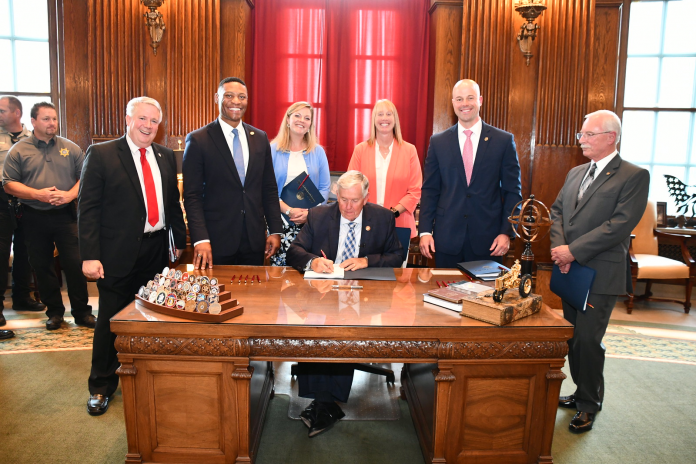We have now started the 3rd week of our Missouri legislative session. The Governor is announcing his priorities, and members of both the House and Senate have been building their respective agendas. This Wednesday afternoon, I’ve also scheduled a judiciary committee hearing on a bill intended to help farmers in the “grain belt” corridor from losing their farms to private eminent domain. We’ve got to close the loophole in Missouri law that big businesses use to take private land.
As one of my biggest jobs and in responding to federal vaccine mandates, I have also been tasked with helping lead Missouri’s fight to protect individual rights against government overreach. The House Judiciary Committee has been assigned twenty six (and counting) COVID related bills, and as committee chair, It’s my job to hold the hearings, seek public opinion, help frame the debate, and to help move the bills along as quickly as possible.
While working through these COVID bills, I’ll never forget the Bill of Rights. Throughout history, how many politicians have declared that it’s for your own good—“just trust me.” Arguably, all of us have. The authors of our Bill of Rights innately understood that “absolute power corrupts absolutely.” The rights guaranteed in our constitutition are designed to protect us from government power, not to extend it. The duty to serve the greater welfare must never be allowed to trample or ignore the rights of the individual. Washington called this challenge the “great experiment” of American democracy.
A few days ago, the United States Supreme Court handed down two COVID decisions. At least in part, these decisions by the highest court in the land frame the law on federal COVID mandates. Their decision in throwing out President Biden’s mandate requiring private business to vaccinate employees was a welcome breath of fresh air, but their other decision was disappointing. Under the facts of both cases, the mandates were made by executive order followed by emergency rule without any specific Congressional approval and without following the normal rule making process.
In the 6-3 decision in National Federation of Independent Business versus Department of Labor, the Supreme Court concluded the President could not unilaterally require private businesses to order its employees to obtain COVID vaccines. In a clear opinion by the Supreme Court, the Court held that: “The Secretary has ordered 84 million Americans to either obtain a COVID–19 vaccine or undergo weekly medical testing at their own expense. This is no “everyday exercise of federal power.” … It is instead a significant encroachment into the lives—and health—of a vast number of employees. ‘We expect Congress to speak clearly when authorizing an agency to exercise powers of vast economic and political significance.’… There can be little doubt that OSHA’s mandate qualifies as an exercise of such authority. The question, then, is whether the Act plainly authorizes the Secretary’s mandate. It does not.”
In the 5-4 decision in Biden versus Missouri, two justices (Kavanaugh and Roberts) switched sides. Although Congress neither approved nor passed the presidential mandate nor did Congress authorize more bureaucracy, the Court did. Quoting the majority opinion: “Of course the vaccine mandate goes further than what the Secretary has done in the past to implement infection control.” However broadly interpreting one line in the definition of the single word “hospital” in the old code, the majority decides it’s close enough.
Although the majority opinion recognized the dissents “narrower view” of the authority granted by the US Congress in the Medicare/Medicaid statutes, the majority concludes (quoting the majority opinion): “But the longstanding practice of Health and Human Services in implementing the relevant statutory authorities tells a different story.”
If they (the bureaucrats) can now tell their own “story” long enough without the United States Congress acting, I guess that means the “story” becomes reality as a new law.
In a separate dissenting opinion Justice Alito explains it best: “Today’s decision will ripple through administrative agencies’ future decision making. The Executive Branch already touches nearly every aspect of Americans’ lives. … Neither CMS [Centers for Medicare and Medicaid Services] nor the Court articulates a limiting principle for why, after an unexplained and unjustified delay, an agency can regulate first and listen later, and then put more than 10 million … dissenting healthcare workers to the choice of their jobs or an irreversible medical treatment. … I respectfully dissent.” And I agree.
What would President George Washington think about his constitutional “great experment?” He would be very worried.
In House Judiciary, we have held hearings on 6 of the pending COVID bills and will be scheduling further hearings on many others within the next few weeks. I’ve already received written testimony on several bills from folks in the district, and I would like to hear your thoughts. Please watch the House website for the next Judiciary Hearings. You can offer your testimony and your opinion on-line through that same site.
It is my honor to represent your common sense values. If you would like to schedule a specific time to meet locally or at the Capitol, please call my office at 573-751-1455, or email my office at david.evans@house.mo.gov.






